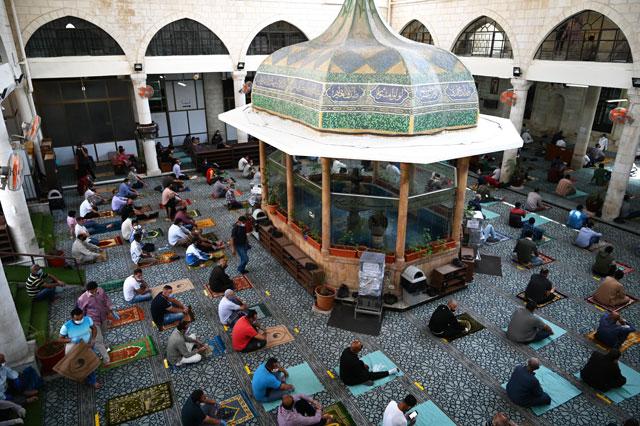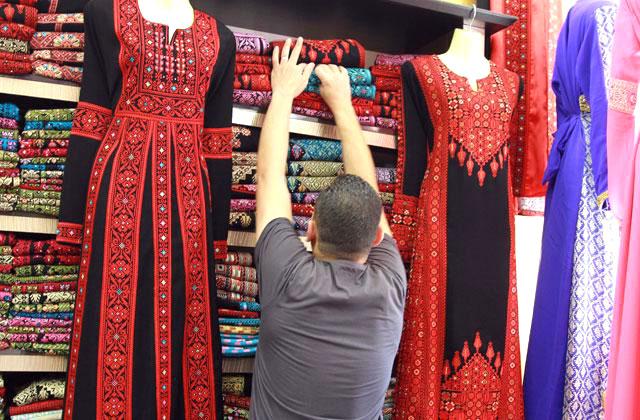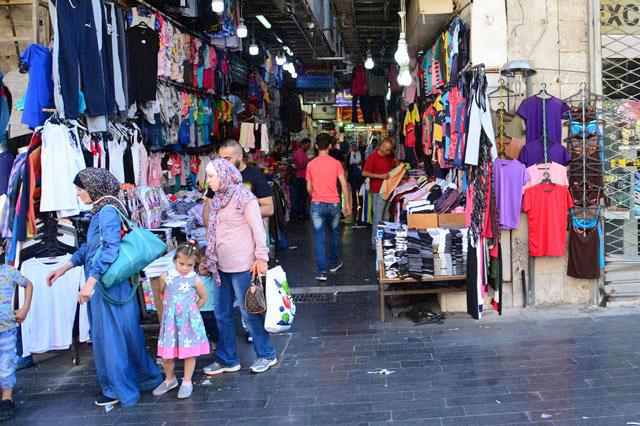You are here
Reduced curfew hours, loosening regulations signal gradual return to 'normalcy'
By Bahaa Al Deen Al Nawas - Jun 06,2020 - Last updated at Jun 06,2020

Friday prayer resumed at mosques this weekend according to health and safety protocols, with photos and videos showing people wearing gloves and face masks during the prayers circulated on social media (Photo by Amjad Ghsoun)
AMMAN — After business hours were expanded and curfew hours were reduced on Saturday following two-and-a-half months of curfew, people and workers started the day with a greater sense of normalcy as traffic returned, restaurants opened and people headed to their jobs and gathered at cafes.
According to merchants and officials in the clothing and restaurants sectors, however, many issues need to be addressed for the economy to pick up again after the damage it suffered during the coronavirus crisis.
The decisions taken by the government on Thursday, including resuming movement between governorates and removing the odd and even licence-plate vehicle system, will "decrease limitations" and allow merchants to attain the capital to purchase stocks and necessities, Textile and Readymade Clothes Syndicate President Muneer Deyeh told The Jordan Times on Saturday over the phone.
"Increasing working hours until 11pm will also help improve movement in the markets, alongside opening other sectors, which when vitalised will reflect on each other, and so the government's decisions to reopen business sectors will hopefully bring life back to normal gradually," Deyeh said.
The lockdown and the comprehensive curfew every Friday “took their toll” on the sector and trading in general, he said.
“While it is positive that everything is open, we still require economic decisions and steps," Deyeh stressed.
These steps include addressing the issue of shop rental payments, Deyeh said, calling for a Defence Order to end the dispute between renting merchants and landlords. He further urged a revision of the tax load, particularly sales tax.
"People have limited purchasing power and implementing such decisions will encourage movement, so we cannot stop at opening the sector, especially since the clothing sector was categorised by the government as among the hard-hit sectors," he said.
Merchants and clothing importers also expressed their fears regarding a recession in the sector during a meeting organised by the Amman Chamber of Commerce, at the top of which are high customs and tax fees and a lack of liquid assets.
The traders demanded facilitations from banks to receive funding under soft terms, injecting more liquidity into the market as well as finding new mechanisms for clearing cheques. They also demanded that the work stoppage fund continue to pay the salaries of employees until the end of the year.
For his part, President of the Jordan Association for Restaurants and Sweets Shops Owners Omar Awad said that he expects there will be some demand on restaurant food in the first few days, "but the economic conditions are bad, so we cannot expect a lot of customers".
Restaurants and cafes must work round-the-clock in order to be able to “pick-up” and pay their dues and commitments, he said.
"We demanded that the government do something about the Landlords and Tenants Law to settle disputes and have landlords postpone the payment of rent, and there are also electricity bills piling up while barely any work has been done yet," Awad said, noting that "many areas" need to be addressed in order for all parties to move forward.
"We want to pay our dues — we do not want to avoid them — but patience is necessary for that happen," he concluded.
The resumption of Friday prayer at mosques — followed by all prayers being permitted to be held at mosques on Saturday around the Kingdom — also signalled another step towards normalcy.
Photos and videos showing people wearing gloves and face masks during the prayers circulated on social media over the weekend, displaying the public’s commitment to physical distancing, while Muslim worshippers expressed their "happiness" at returning to mosques to pray.
Commenting on photos posted on Facebook, Hussein Nasser Ershedat wrote: "There were fears that worshippers would not commit to social distancing, but they have proven their commitment."
Khaled Alhjjaji wrote: "The worshippers have shown elegance in shouldering their responsibility, making us forget the suffering we have been through during the coronavirus crisis, which I hope has taught us a lesson on how to commit and show awareness."
Many others commented that the return of regular worship at mosques and churches has also provided them with "a sense of normalcy as well as freedom".
During a press conference at the National Centre for Security and Crisis Management, Minister of State for Media Affairs Amjad Adaileh had said that shops would be permitted to open between 6am and 11pm from Saturday onwards.
The minister added that mosques and churches would reopen for prayers as of Saturday, with worshippers allowed to go to mosques on foot to perform the dawn prayer, which falls within the curfew hours.
Related Articles
AMMAN — A reinstatement of strict measures and comprehensive curfews will only occur if 10 local coronavirus infections are registered daily
AMMAN — A clothing sector representative on Monday demanded allowing shops to fully open and to cancel the curfew imposed at midnight until
AMMAN — Around 800 clothing and shoe shops have shut down during the past five years due to an increase in rent, the Textile and Readymade C



















